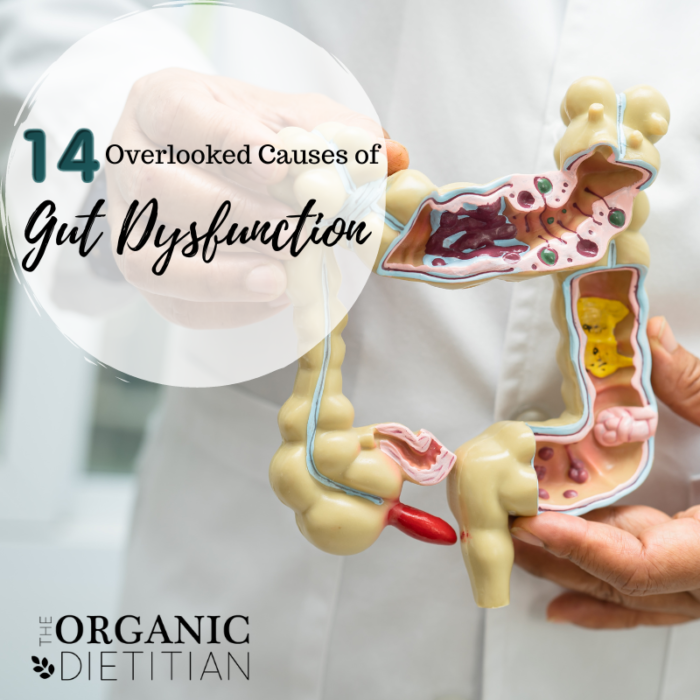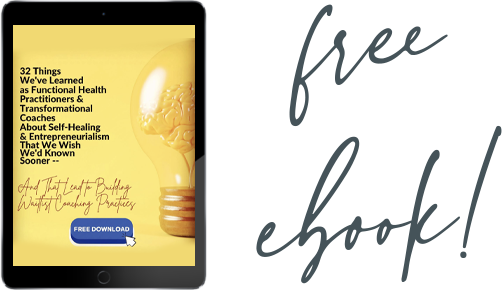3 November, 2023
14 Surprisingly Overlooked Causes of Gut Dysfunction That You Need to Know About For Optimal Health

Do you suffer from chronic gut dysfunction, but can’t seem to pinpoint the root cause? Despite common knowledge of poor nutrition, food intolerances, and chronic stress contributing to gut issues, there are several lesser-discussed and overlooked underlying causes of gut dysfunction that could also be contributing to your symptoms.
Disordered Habitual Breathing Patterns
Did you know that how you breathe plays a significant role in digestive function? Disordered breathing patterns, such as chest breathing or holding your breath, can lead to decreased oxygenation and poor digestion. By focusing on deep belly breathing, you can improve oxygenation and support healthy digestion.
CO2 Intolerance
Research suggests that CO2 intolerance, or the inability to tolerate increased carbon dioxide levels, can lead to mitochondrial dysfunction and contribute to digestive issues. Simple techniques such practicing breath holds can help improve CO2 tolerance and mitochondrial function.
Diaphragm Dysfunction
The diaphragm is a crucial muscle for proper breathing and digestive function. When it becomes weakened or dysfunctional, it can contribute to abdominal pain and discomfort. Strengthening exercises such as diaphragmatic breathing and yoga can help improve diaphragm function.
Psoas Muscle Dysfunction
The psoas muscle plays a role in gut and back health. When it becomes tight or weak, it can lead to digestive issues and back pain. Targeted exercises such as hip flexor stretches and psoas strengthening exercises can support healthy digestion.
Mineral Imbalances
Imbalances in minerals such as magnesium, zinc, and calcium can contribute to gut dysfunction. These minerals play a role in digestive enzyme production, gut motility, and immunity. Testing for deficiencies and adjusting your diet or supplementation accordingly can improve mineral balance and gut health. The number one lab I suggest is a hair tissue mineral analysis test also known as a HTMA but it is critical that you work with a skilled practitioner that will help you get the most of the information that can be gained from this test. In fact, I help to teach practitioners how to interpret and implement HTMA to its fullest in our Holistic HTMA Pro coarse you can check out HERE.
Super Low Cortisol
Low cortisol, both free and metabolized, can lead to poor digestion and decreased gut motility. This can be caused by chronic stress or adrenal dysfunction. Addressing the underlying cause and seeking support from a healthcare provider can improve cortisol levels and digestive function.
Adhesions
Adhesions, or bands of scar tissue, can develop in the digestive tract after surgery or injury. These adhesions can interfere with digestion and contribute to abdominal pain and discomfort. Treatment options include manual therapy and surgery.
Poor Personal Boundaries
Believe it or not, personal boundaries can impact digestive health. When we don’t assert our boundaries, we can take on excess stress and anxiety, leading to digestive distress. Learning healthy boundary-setting techniques and self-care practices can support gut health.
Long-term Impact of Trauma
Trauma, whether physical or emotional, can have long-term impacts on digestive health. The stress response can interfere with digestion and gut motility. Seeking trauma-informed care and support can improve gut function and overall well-being.
Related Blog Post: Nervous System, Trauma, and Gut Health: What’s the Connection?
Perfectionism
Believe it or not, perfectionism can contribute to gut dysfunction. This tendency can lead to excess stress and anxiety, impacting digestive function. Practicing self-compassion and letting go of perfectionism can support healthy digestion.
Eating Habits Dysfunction
Eating habits such as grazing, night eating, and multitasking can interfere with proper digestion. The digestive system needs rest to heal. It’s like walking around on a broken foot and expecting it to heal. Focusing on mindful eating and creating a nourishing mealtime routine can improve gut function.
Red-Light Deficiency and/or Blue Light Toxicity
Exposure to red-light therapy can improve gut motility and function. Similarly, exposure to blue light from screens and electronics can negatively impact digestive health. Minimizing screen time and incorporating red-light therapy into your routine can support digestive health.
Plant Toxin & Fiber Intolerance
While plants are generally considered healthy, some individuals may have intolerances to certain plant toxins or fibers. Eliminating or reducing these foods from your diet can improve gut function and decrease inflammation.
Weak Core & Core Dysfunction
Core strength plays a role in gut motility and healthy digestion. Weakness or dysfunction in this area can contribute to constipation and digestive discomfort. Strengthening exercises such as planks and pelvic floor exercises can support core function and gut health.
In conclusion, gut dysfunction can have many underlying causes, some of which are rarely discussed. By considering the above factors and seeking targeted support, you can improve digestive function and overall well-being.
How to Get Support?
If you are a wellness coach or practitioner that works with clients that have autoimmune diseases then it is important to become trauma informed. Wellness Code Academy practitioner certification program is a dynamic, trauma-informed, beyond-the-biochemical, and truly holistic coaching system that takes…
The deepest dive ever into healing the gut, brain, nervous system, and mitochondria—and also taps into the power of the subconscious mind to support healing the psyche? Learn more HERE.
Learn more about my approach with clients: My Health and Healing Philosophy
I believe ANY HEALING JOURNEY ultimately needs to involve addressing BOTH the body and the mind in the proper way and in the proper order which will be highly individual.
It also is a HUGE reason why I see many feel stuck on their own healing journeys because this concept hasn’t been adequately acknowledged, understood or addressed.









